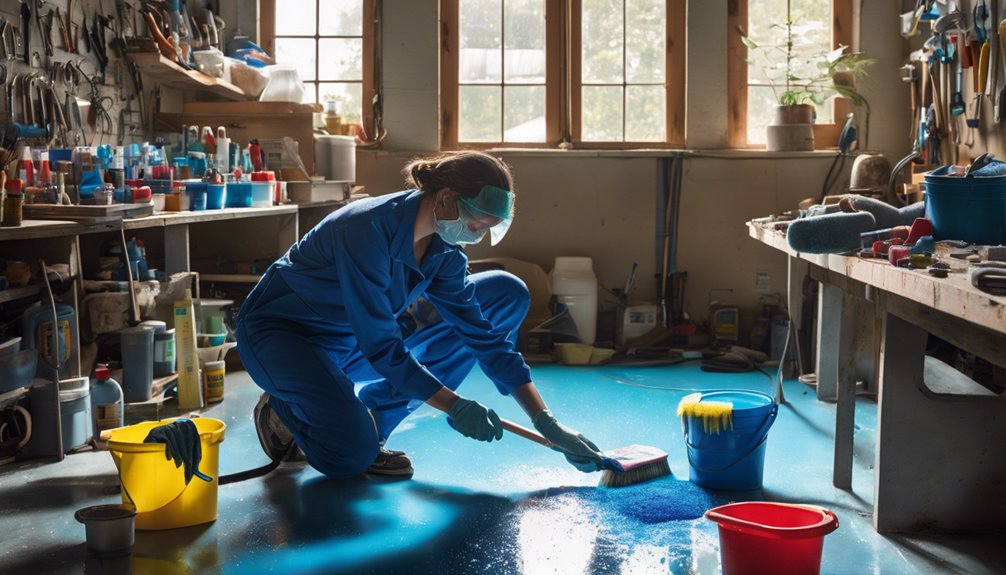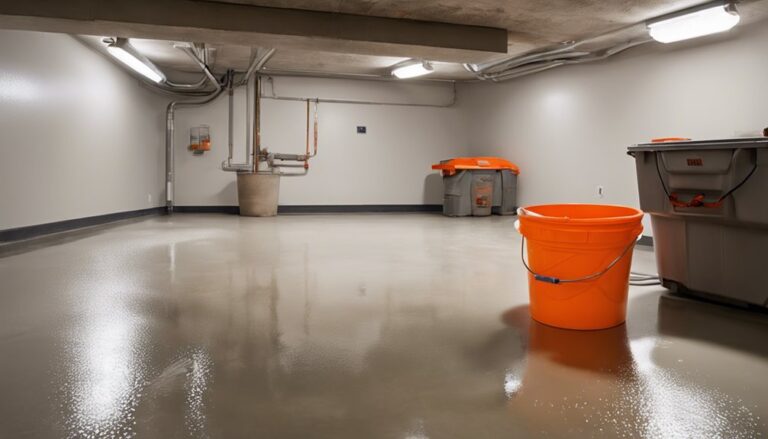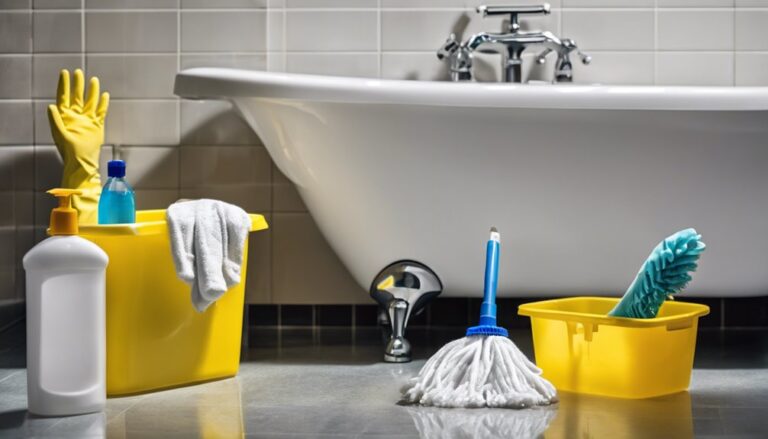To clean your epoxy garage floor, start by gathering supplies like a mild detergent, degreaser for tough stains, a soft-bristle broom, and a microfiber mop. First, sweep or vacuum away loose dirt and debris. For stains, use a degreaser for oil or vinegar for rust. Mop the entire surface with a pH-neutral cleaner, then rinse with clean water to avoid residue. Always dry the floor completely to prevent moisture issues. Regular maintenance will keep your floor looking great for years. You might be surprised at what else you can do to care for your epoxy!
Importance of Regular Cleaning
While you might think that an epoxy garage floor is durable enough to withstand the wear and tear of daily use, regular cleaning is essential to maintaining its appearance and longevity. Ignoring cleaning frequency can lead to dirt and grime buildup, which not only detracts from its shine but can also cause damage over time. By committing to a consistent cleaning routine, you'll help preserve that sleek look and extend the surface longevity of your floor. Think of it as a small investment in your garage's aesthetic and functionality. With just a bit of effort, you can keep your epoxy floor looking fresh, ensuring it remains a space where you truly feel at home, free from unsightly stains and wear.
Gather Your Cleaning Supplies
Before diving into the cleaning process, it is crucial to gather your cleaning supplies. Having the right cleaning products on hand will make your job easier and more effective. Depending on your surface types, you'll need specific tools to tackle different messes.
Here's a handy table to help you decide what you'll need:
| Cleaning Product | Surface Type |
|---|---|
| Mild detergent | Epoxy floors |
| Degreaser | Oil stains |
| Soft-bristle broom | Dust and debris |
| Microfiber mop | General cleaning |
Make sure to have these items ready, so you can enjoy the freedom of a clean and organized garage floor. With the right supplies, you'll breeze through the cleaning process!
Remove Loose Debris
Before you start cleaning your epoxy garage floor, it's important to remove any loose debris. Grab a broom or vacuum to sweep up dust, dirt, and small particles that could interfere with the cleaning process. This step guarantees you're working with a clean surface for the best results.
Gather Cleaning Tools
To effectively clean your epoxy garage floor, start by gathering the right cleaning tools to remove loose debris. You'll want a sturdy broom or a vacuum designed for hard surfaces, as these are your best allies in tackling dirt and dust. A dustpan will help you collect the debris easily, and a microfiber cloth can be handy for any stubborn spots. If you have any larger items or clutter, grab a storage bin to clear your space. Remember, having the right tools at hand is an essential step toward effective solutions for cleaning. With these essentials ready, you're well-equipped to create a clean and inviting garage environment that reflects your freedom to organize and maintain your space.
Sweep or Vacuum
Now that you've gathered your cleaning tools, it's time to tackle the loose debris on your epoxy garage floor. Start by using effective sweeping techniques. A soft-bristled broom works wonders, allowing you to collect dirt and dust without scratching the surface. Sweep in one direction to keep things organized, and don't forget those corners!
If you prefer, vacuuming can be a great option too. Use a shop vacuum, as it's powerful enough to handle the debris without harming the epoxy. For vacuuming tips, make sure you've got the right attachments to reach tight spots. Whether you choose to sweep or vacuum, removing this loose debris is vital for maintaining that sleek, clean look you desire. Enjoy the freedom of a spotless garage!
Spot Clean Stains
Spot cleaning stains on your epoxy garage floor is a straightforward process that can keep it looking pristine. You'll want to act quickly for effective stain removal. Here's a handy guide to help you choose the right cleaning solutions based on the stain type:
| Stain Type | Recommended Cleaning Solution | Application Method |
|---|---|---|
| Oil | Degreaser or dish soap | Apply, scrub, rinse |
| Paint | Paint thinner or acetone | Dab, scrub gently, wipe |
| Rust | Vinegar or rust remover | Apply, let sit, scrub |
| Food | Warm soapy water | Scrub, rinse |
| Tire Marks | Baking soda paste | Apply, scrub, rinse |
Follow these tips, and you'll keep your garage floor looking great!
Mop the Floor
Mopping your epoxy garage floor is essential for maintaining its shine and cleanliness. Start by choosing the right mop type; microfiber mops work great for capturing dirt without scratching the surface. You can also consider a sponge mop if you prefer more absorbency. For effective mopping techniques, begin by sweeping or vacuuming to remove loose debris. Next, dampen your mop with a mild cleaning solution mixed with water, avoiding harsh chemicals that could damage the epoxy. Mop in a figure-eight motion, ensuring you cover all areas evenly. Rinse the mop frequently to prevent spreading dirt around. Once you're done, let the floor air dry, and you'll enjoy a fresh, gleaming garage that's a joy to walk on!
Deep Cleaning Techniques
When it comes to deep cleaning your epoxy garage floor, having the right supplies is key. You'll want a clear step-by-step process to tackle tough stains and maintain that shiny finish. Plus, I'll share some handy tips and tricks to keep your floor looking great long after the deep clean.
Essential Cleaning Supplies
To effectively clean your epoxy garage floor, you'll need a few essential supplies that can make the process smoother and more efficient. Start with a broom or a vacuum cleaner to remove loose debris and dust. Next, grab some gentle cleaning products specifically designed for epoxy surfaces—avoid harsh chemicals that could damage the finish. You'll also need a mop, preferably microfiber, for applying your cleaning solution. An extension handle can be handy for reaching corners without straining your back. Don't forget a bucket for mixing water and cleaner. Finally, consider rubber gloves to protect your hands while you work. With these essential tools in hand, you'll be well-equipped to tackle your deep cleaning project!
Step-by-Step Process
A thorough cleaning of your epoxy garage floor can be accomplished in just a few simple steps. Start by sweeping away loose dirt and debris to prevent scratching. Next, mix a mild detergent with warm water and use a mop or soft-bristle brush to scrub the surface, focusing on stains and spills. Rinse thoroughly with clean water to avoid residue buildup. For tougher stains, consider using a specialized epoxy cleaner, but always test it in a small area first. To maintain your floor's shine and enhance epoxy longevity, aim for a cleaning frequency of at least once a month. Regular maintenance not only keeps your garage looking great but also extends the life of your epoxy flooring, giving you the freedom to enjoy your space.
Maintenance Tips and Tricks
Keeping your epoxy garage floor in top shape requires more than just regular cleaning. To maintain its epoxy durability, you'll want to deep clean periodically. Start by sweeping away dust and debris, then mop with a mixture of warm water and a gentle pH-neutral cleaner. For stubborn stains, a soft-bristled brush and some baking soda can work wonders without scratching the surface.
To enhance floor aesthetics, consider applying a sealant every couple of years to protect against wear and tear. Avoid harsh chemicals that can degrade the epoxy. Finally, keep sharp objects off the floor to prevent scratches and scuffs. By following these tips, you'll guarantee your garage floor remains both functional and visually appealing for years to come!
Drying the Surface
When it comes to drying the surface of your epoxy garage floor, patience is key. Proper surface preparation is essential before you engage in cleaning. Start by using a squeegee or mop to remove excess water, ensuring you don't leave puddles behind. Employ effective drying techniques like using fans or dehumidifiers to speed up the process. Open windows and doors to improve airflow, and consider using heat to help evaporate moisture more quickly. Remember, a well-dried surface not only looks great but also enhances the longevity of your epoxy finish. Never rush this step; allowing the floor to dry thoroughly keeps it looking pristine and ready for whatever you throw at it next. Enjoy your clean, dry garage!
Preventive Maintenance Tips
Once your epoxy garage floor is clean and dry, implementing preventive maintenance can greatly extend its lifespan. Start by conducting routine inspections to catch any signs of wear or damage early on. Look for cracks, chips, or discoloration, and address these issues promptly to prevent further deterioration. Use preventive measures like mats or rugs in high-traffic areas to reduce abrasion. Additionally, avoid dragging heavy objects across the floor, as this can cause scratches. Regularly sweep or vacuum to remove dirt and debris, and mop with a gentle cleaner to keep it looking pristine. By staying proactive and attentive, you'll enjoy a beautiful, durable garage floor that supports your freedom to use the space without worry.
When to Reapply Epoxy
Although it might seem intimidating, knowing when to reapply epoxy can help maintain the integrity of your garage floor. The typical epoxy lifespan is around 5 to 10 years, but several reapplication signs indicate it's time to refresh your flooring.
Look out for these key signs:
- Fading and discoloration: If your epoxy's lost its vibrant color, it's time to think about a recoat.
- Cracks and chips: Any visible damage is a clear signal that your floor needs attention.
- Peeling or flaking: This can compromise the floor's durability and appearance, urging you to act.
Frequently Asked Questions
Can I Use Bleach to Clean My Epoxy Garage Floor?
Did you know that nearly 70% of homeowners prefer using eco-friendly cleaning solutions? When it comes to your epoxy garage floor, using bleach isn't the best idea. It can damage the surface and lead to discoloration. Instead, consider bleach alternatives like vinegar or baking soda mixed with water. These options are not only safer for your floor, but they're also effective in cutting through grime, leaving your space looking fresh and clean.
How Often Should I Deep Clean My Epoxy Floor?
You should deep clean your epoxy floor at least once or twice a year, depending on its usage. Regular cleaning frequency helps maintain its shine and durability. In between deep cleans, sweep and mop regularly to keep dirt and debris at bay. For maintenance tips, consider using non-abrasive cleaners to avoid damage. Staying on top of cleaning will guarantee your floor looks great and lasts longer, giving you the freedom to enjoy your space.
Will Hot Water Damage My Epoxy Garage Floor?
Hot water won't damage your epoxy garage floor, but it can actually offer benefits when it comes to cleaning. Using hot water helps dissolve dirt and grime more effectively, making your epoxy floor care easier and more efficient. Just be sure not to use boiling water, as extreme temperatures could affect the bond of the epoxy. A warm water solution is ideal for keeping your floor looking great while maintaining its durability.
Can I Use a Pressure Washer on Epoxy Flooring?
Think of your epoxy flooring as a canvas. When it comes to pressure washing, it's like using a fire hose on a delicate painting—too much force can damage the surface. While you can pressure wash, it's crucial to use a low-pressure setting and a wide spray angle. This approach helps maintain the integrity of your epoxy flooring while effectively removing dirt and grime, giving you the freedom to enjoy a clean, vibrant space.
What Should I Do if My Epoxy Floor Gets Scratched?
If your epoxy floor gets scratched, don't panic! Start by cleaning the area to remove any debris. For minor scratches, you can use a scratch repair kit specifically designed for epoxy floors. Follow the instructions, and you'll restore the shine. For deeper scratches, a professional touch might be necessary. Remember, regular floor maintenance can help prevent future scratches and keep your floor looking great, letting you enjoy your space freely!




